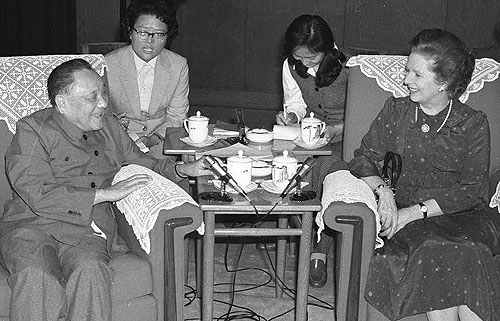|
 |
|
SEEKING COMMON GROUND: Chinese leader Deng Xiaoping meets with British Prime Minister Margaret Thatcher at the Great Hall of the People in Beijing on September 24, 1982 (XINHUA) | To keep a dynamic balance between the three, China should make them coordinate with one another and advance side by side. Here, a dynamic balance means that, within a certain period, adjustments can be made to satisfy the special need of one demand. In general, however, the developments of all three should be sustained, and it is a balance in permanent changes.
To achieve this goal, China must establish a sound concept of balance to prevent infinite expansion of one single interest. Next, it must establish a balance between national interests and international responsibilities. Of course, preferential policies and policy adjustments will prevail in emergencies, such as an important domestic demand or an international crisis.
Today, China should continue to give priority to economic development at home. Meanwhile, it needs to undertake more international responsibilities, and provide more assistance when the world outside its borders suffers from big natural disasters or crises. It should not care only about the 1.3 billion Chinese people.
According to China's current political and economic conditions, what kind of diplomatic framework is the most suitable?
Currently, Chinese diplomacy should advance on four simultaneous fronts. First, China must develop relations with neighboring countries. To do so will require realizing mutual security, prosperity and development through regional integration, while carrying out the diplomatic policy of "fostering an amicable, secure and prosperous neighborly environment."
The second priority involves developing relations with major world powers, including the United States, Japan, Europe and Russia. In particular, this requires maintaining strategic dialogues.
Third, China must develop relations with other developing countries in Asia, Africa and Latin America. China needs the help of such nations and should reciprocate their help with assistance in the fields of the economy, education and culture. In recent years, for instance, China has exempted debts by the world's least developed countries, and carried out zero-tariff policies in its trade with some developing countries.
The fourth priority should be to develop relations with multilateral international organizations, institutions and treaties. These include the UN, the Group of 20, the International Monetary Fund, the World Trade Organization, the World Bank and the Nuclear Non-proliferation Treaty.
In which aspects should Chinese diplomacy make more efforts or improve?
There is indeed plenty of room for improvement. First, Chinese diplomats need to learn how to face the public at home and how to deal with NGOs in the international arena.
Today's world possesses three dimensions: a political world, an economic world and a social world. China is now a major power in the economic sphere and is catching up in the political arena. Its performance in the social world, however, is not good enough.
China, moreover, should learn to listen to the diverse voices of the media, the public and various independent organizations. In addition, it should learn to face the complexities of the international community. This includes changing its current slightly clumsy image.
Second, China should learn from the experience of developed countries by diversifying the channels for recruiting diplomats so as to avoid the emergence of interests of only one group. In addition, a "revolving door" system for the exchange of scholars, business elites and government officials should be promoted with good efforts and in good faith.
The third goal should be to maintain a friendly image with good credit. Valuing and keeping promises are the common virtues of the best diplomats around the world. Late Premier Zhou Enlai, for instance, was revered for his ability to be amiable, while highlighting the practical effects of his speeches. President Hu Jintao also attaches great importance to making China friendly to the outside world. This is a skill worth learning for the new generation of Chinese diplomats.
Fourth, China must change the thinking of its diplomats while reforming its diplomatic systems. Diplomacy is not a commercial interaction. Instead, it requires promoting the national image, according to different demands in different periods.
|
